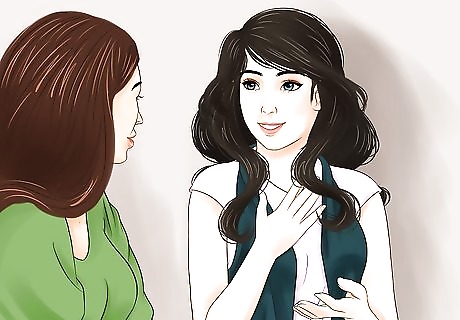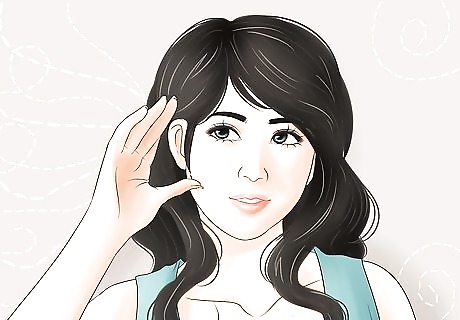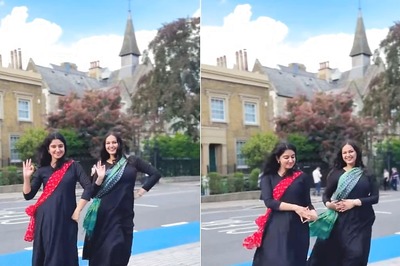
views
Having a Charming Attitude

Be genuinely interested in people. You don't have to love everyone, but you should be curious or fascinated by people in some way. Charming people walk into a room full of people ready to spend time talking to others; they don't stand against the wall waiting for the moment when they can escape. What interests you about other people? If you're empathetic, maybe you're interested in how people feel. Maybe you're interested in what makes people tick, or what knowledge they hold. Use your interest as the basis for getting to know people. Learn how to ask questions based on your interests while being polite and others will feel they are interesting. Follow up with more questions to continue showing your interest; the person you're talking to should never feel that you're trying to cut the conversation short.

Remember people's names when you meet them for the first time. This takes an enormous amount of effort for most people, but it's completely worth doing if you want to be charming. When introducing yourself, repeating the person's name will help you to remember it. For example: "Hi, Jack, I'm Wendy." Follow through with small talk and use the person's name during your conversation. Repeat it once more when you say goodbye. Repeating someone's name is not just about helping you to remember that person. The more often you say someone's name, the more that person will feel that you like them and the greater the chance they'll warm up to you. If someone else walks up while you're having a conversation, introduce the two people by name.

Assume rapport. This simply means talking to a stranger or a newly met acquaintance in a very friendly manner, as if the person is a long lost friend or relative. This helps break down an initial awkwardness and speeds up the warm-up process when meeting new people. Soon, people feel more welcomed and comfortable around you. Kindness, coupled with respect, makes others feel as if they are loved and cared for. This is a powerful tool during interaction.

Talk about topics that interest the people you're with. If you're in a sporty crowd, talk about last night's game or the meteoric rise of a new team. If you're with a group of hobbyists, ask about their hobbies and make pertinent remarks related to fishing, knitting, mountain climbing, movies, and so on. Nobody expects you to be an expert. Sometimes you can build rapport just by asking questions, and not caring if you seem naive. There are people who like talking about and explaining their interests, and will like you for listening. It is your level of interest and willingness to engage in topics that makes you an interesting person to be around. Exercise an open mind. Let others do the explaining. If someone mistakenly thinks you know more about the topic, be genuine and simply say that your knowledge is limited but that you're hoping to learn more about it.

Share information about yourself. Being quiet about yourself makes you seem standoffish. Sharing as much about yourself as you ask others to share is a way to build trust with other people. They'll feel special because you wanted to talk about your life with them, and before you know it you'll have new friends.
Wielding Physical Charm

Make eye contact. Looking at people directly in the eyes gives you a certain hold over them. It projects confidence on your end while making the person you're speaking with feel that they are interesting enough to gaze upon. Keep eye contact throughout the conversation. No matter what you're talking about, holding the person's eyes will make you seem more charming.

Smile with your eyes. Scientists have pinpointed more than 50 types of smiles, and research suggests that the sincerest smile of all is the Duchenne smile - a smile that pushes up into the eyes. The reason it's more genuine is because the muscles needed to smile with our eyes are involuntary; they only become engaged in an authentic smile, not in a courtesy smile. Also, if you look at someone and then smile, it will instantly charm them.

Give a firm handshake. Shaking a person's hand when you first meet them is a polite way to show the person they're someone you want to talk to. Use a firm grip, but don't hold on too tight - you don't want to hurt the person's hand. After one good shake, release the person's hand from your grip. In regions where shaking hands is not customary, use a different appropriate physical gesture to show you're interested in talking to someone. A kiss on both cheeks, a bow, or another physical gesture gets the conversation off to a good start.

Use charming body language. Face the person you're talking to so that it doesn't seem as though you're anxious to walk away as soon as the conversation is over. During the course of the conversation, it may be appropriate to use light touching to keep it moving. You can lightly touch the person's shoulder to emphasize a point, for example. At the end of the conversation, decide whether it's appropriate to give a quick hug or another handshake.

Control your tone and speed of voice. Your voice should be gentle and peaceful, yet direct. Don't talk too fast as this makes you appear nervous, but if you talk too slow people could think you are unintelligent, you need to speak slow enough that your words are clear but not slow that it feels like the conversation is dragging on. Articulate your words clearly and project your voice. Practice giving compliments into a recorder and play it back. Does your voice sound sincere?
Charming People With Words

Use impressive phrasing. Be mature and use a touch of wise, polite language. Don't you find people that say "Hello" are much more charming than people that mutter "'Sup"? Here is another example: Change "It's none of his beeswax!" to "It shouldn't be any of his concern." Of course, don't overdo it, but try to be polite and turn every negative into a positive.

Issue compliments generously. Compliments raise others' self-esteem and make them feel fondly toward you. If you like someone, find a creative way to say it and say it immediately. If you wait too long, it may be viewed as insincere and badly timed, especially if others have beaten you to it. If you notice that someone is putting a lot of effort into something, compliment them, even if you feel that there is room for improvement. If you notice that someone has changed something about themselves (haircut, manner of dress, etc.), notice it and point out something you like about it. If you're asked directly, be charming and deflect the question with a very general compliment.

Be gracious in accepting compliments. Get out of the habit of assuming that a compliment is being given without genuine intent. Even when someone makes a compliment out of contempt, there is always a germ of jealous truth hiding in their own heart. Be effusive in accepting the compliment. Go beyond a mere "Thank you" and enjoin this with "I'm glad you like it," or "It is so kind of you to have noticed." These are compliments in return. Avoid backhanding a compliment. There is nothing worse to a person complimenting than to receive the response "Oh well, I wish I were as ______ as you in that situation." This is tantamount to saying, "No, I am not what you are saying I am; your judgment is wrong."

Praise others instead of gossiping. If you're speaking with someone or you're talking in a group of people, and up pops the subject of another person in a positive or negative way, be the one to mention something you like about that person. Kind hearsay is the most powerful tool in gaining charm because it is always viewed as 100 percent sincere. It has the added benefit of creating trust in you. The idea will spread that you never have a bad word to say about anyone. Everyone will know that their reputation is safe with you.

Be a good listener. Charm isn't always an outward expression, but an inward one too. Engage the other person to talk more about his or herself, about something that they like, something they're passionate about, about themselves. This makes the other person more comfortable to share and express themselves with you.
















Comments
0 comment